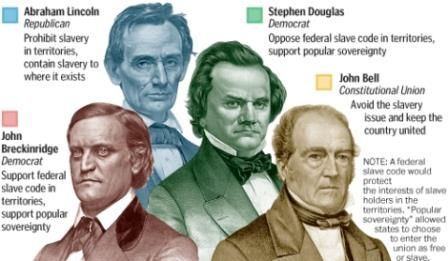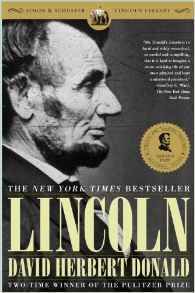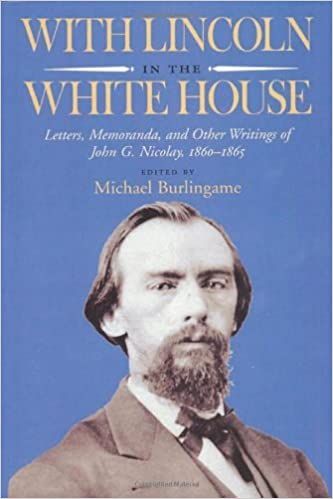
Free Republic University, Department of History presents U.S. History, 1855-1860: Seminar and Discussion Forum
Bleeding Kansas, Dred Scott, Lincoln-Douglas, Harper’s Ferry, the election of 1860, secession – all the events leading up to the Civil War, as seen through news reports of the time and later historical accounts
First session: November 21, 2015. Last date to add: Sometime in the future.
Reading: Self-assigned. Recommendations made and welcomed.
Posting history, in reverse order
To add this class to or drop it from your schedule notify Admissions and Records (Attn: Homer_J_Simpson) by reply or freepmail.
Link to previous Harper’s Weekly thread
To: chajin; henkster; CougarGA7; BroJoeK; central_va; Larry Lucido; wagglebee; Colonel_Flagg; Amagi; ...
Beginning with the May 26 edition and continuing through the June 30 edition there was a problem with the original copies from which the pdf files were created. There was apparently water damage along the spines of the magazines so there are blank spots on the bottom corners of each page, which translates in to blank spots on every page or so of my recreated. I have omitted a few articles that have serious gaps in them. I have included the serials that some readers may be following even when there are gaps. The June 30 issue is the worst and the problem appears to end there. I will add a notice if it starts again.
The Japanese Embassadors – 1-3
The Oldest Pauper on the Town – 3
Editorials – 3-4
The Lounger – 4-6
Humors of the Day – 6
Hon. Hannibal Hamlin, of ME, Republican Candidate for the Vice-Presidency – 7
Japanese Whittlings – 7-8
The Tornado at Cincinnati – 9
The Woman in White, by Wilkie Collins, Part II, Hartright’s Narrative Continued – 9-12
Domestic Intelligence – 12-13
Foreign News – 13-14
The Africans of the Slave Bark “Wildfire” – 15-18
The Uncommercial Traveler, No. IX, by Charles Dickens – 19-20
On Board a Slaver – 20-22
Bewitched – 22-23
Captain Brand of the Schooner “Centipede,” by Lieut. Henry A. Wise, U.S.N. (Harry Gringo). Chapter XVII-XVIII – 23-26
Quashy Quando – 26-27
Our Visitors - 27
2 posted on
06/02/2020 5:48:08 AM PDT by
Homer_J_Simpson
("Every nation gets the government that it deserves." - Joseph de Maistre (1753-1821))
To: chajin; henkster; CougarGA7; BroJoeK; central_va; Larry Lucido; wagglebee; Colonel_Flagg; Amagi; ...

Continued from May 19 (reply #3).

David Herbert Donald, Lincoln
3 posted on
06/02/2020 5:50:24 AM PDT by
Homer_J_Simpson
("Every nation gets the government that it deserves." - Joseph de Maistre (1753-1821))
To: chajin; henkster; CougarGA7; BroJoeK; central_va; Larry Lucido; wagglebee; Colonel_Flagg; Amagi; ...
On this date Abraham Lincoln had his photograph taken by Alexander Hesler in Springfield.
“Hesler took a total of four portraits at this sitting. Lincoln's law partner William Herndon wrote of this picture: ‘There is the peculiar curve of the lower lip, the lone mole on the right cheek, and a pose of the head so essentially Lincolnian; no other artist has ever caught it.’"

List of photographs of Abraham Lincoln
4 posted on
06/03/2020 6:09:27 AM PDT by
Homer_J_Simpson
("Every nation gets the government that it deserves." - Joseph de Maistre (1753-1821))
To: chajin; henkster; CougarGA7; BroJoeK; central_va; Larry Lucido; wagglebee; Colonel_Flagg; Amagi; ...
Charles Eliot Norton to James Russell Lowell, June 3, 1860 NEWPORT, 3 June, 1860.
. . . Are you pleased that Mr. Everett has consented to take the nomination for the Vice Presidency? His letter reminds me of the advertisement of “the retired Doctor whose sands of life have nearly run out.” We have patriots left. In the view of the Union party it would seem that the Union itself were in a similar condition to the English gunboats, planks rotted, sham copper bolts not driven half through, and a general condition of unsoundness making them wholly unsafe in a sea.
Yet if the Vengeur should go down under the waves, Bell and Everett will be seen upon the upper deck waving their hands in a graceful oratorical way, and crying with melancholy voice, Vive la République....
SOURCE: Sara Norton and M. A. DeWolfe Howe, Letters of Charles Eliot Norton, Volume 1, p. 208-9
civilwarnotebook.blogspot.com
Charles Eliot Norton Wikipedia page
5 posted on
06/03/2020 6:11:21 AM PDT by
Homer_J_Simpson
("Every nation gets the government that it deserves." - Joseph de Maistre (1753-1821))
To: chajin; henkster; CougarGA7; BroJoeK; central_va; Larry Lucido; wagglebee; Colonel_Flagg; Amagi; ...
Continued from June 1
(reply #21.)

Abraham Lincoln: Speeches and Writings 1859-1865, edited by Don E. Fehrenbacher
7 posted on
06/04/2020 6:28:11 AM PDT by
Homer_J_Simpson
("Every nation gets the government that it deserves." - Joseph de Maistre (1753-1821))
To: chajin; henkster; CougarGA7; BroJoeK; central_va; Larry Lucido; wagglebee; Colonel_Flagg; Amagi; ...
Continued from June 1
(reply #23.)

The Diary of George Templeton Strong, Edited by Allan Nevins and Milton Halsey Thomas
8 posted on
06/04/2020 6:30:12 AM PDT by
Homer_J_Simpson
("Every nation gets the government that it deserves." - Joseph de Maistre (1753-1821))
To: chajin; henkster; CougarGA7; BroJoeK; central_va; Larry Lucido; wagglebee; Colonel_Flagg; Amagi; ...
Senator James W. Grimes to Elizabeth S. Nealley Grimes, June 4, 1860 WASHINGTON, June 4, 1860.
We have just had a four hours speech from Sumner on the “Barbarism of Slavery.” In a literary point of view it was of course excellent. As a bitter, denunciatory oration, it could hardly be exceeded in point of style and finish. But, to me, many parts of it sounded harsh, vindictive, and slightly brutal. It is all true that slavery tends to barbarism, but Mr. Sumner furnishes no remedy for the evils he complains of. His speech has done the Republicans no good. Its effect has been to exasperate the Southern members, and render it utterly impossible for Mr. Sumner to exercise any influence here for the good of his State. Mr. C. F. Adams made a manly, statesmanly speech in the House of Representatives, four days ago, which was attentively listened to by everybody. He read it, as did Mr. Sumner his.
Mr. Seward is now here, and made a speech in Executive session the other day on the Mexican Treaty, that to my view showed more intellectual vigor than did his speech which you heard. His speech to which I refer was short, extemporaneous, and very able, converting almost the whole Senate to his views.
The nomination of Lincoln strikes the mass of the people with great favor. He is universally regarded as a scrupulously honest man, and a genuine man of the people.
SOURCE: William Salter, The Life of James W. Grimes, p. 127-8
civilwarnotebook.blogspot.com
9 posted on
06/04/2020 6:31:59 AM PDT by
Homer_J_Simpson
("Every nation gets the government that it deserves." - Joseph de Maistre (1753-1821))
To: chajin; henkster; CougarGA7; BroJoeK; central_va; Larry Lucido; wagglebee; Colonel_Flagg; Amagi; ...

Continued from May 26 (reply #3)

With Lincoln in the White House: Letters, Memoranda, and Other Writings of John G. Nicolay, 1860-1865, edited by Michael Burlingame
13 posted on
06/05/2020 6:09:30 AM PDT by
Homer_J_Simpson
("Every nation gets the government that it deserves." - Joseph de Maistre (1753-1821))
To: chajin; henkster; CougarGA7; BroJoeK; central_va; Larry Lucido; wagglebee; Colonel_Flagg; Amagi; ...
Andrew Johnson in the United States House of Representatives, June 5, 1860 My position is, that Congress has no power to interfere with the subject of slavery; that it is an institution local in its character and peculiar to the States where it exists, and no other power has the right to control it.
SOURCE: Frank Moore, Speeches of Andrew Johnson, President of the United States, p. xvi
civilwarnotebook.blogspot.com
14 posted on
06/05/2020 6:11:08 AM PDT by
Homer_J_Simpson
("Every nation gets the government that it deserves." - Joseph de Maistre (1753-1821))
FreeRepublic.com is powered by software copyright 2000-2008 John Robinson







